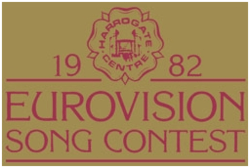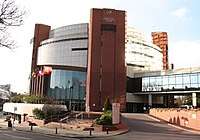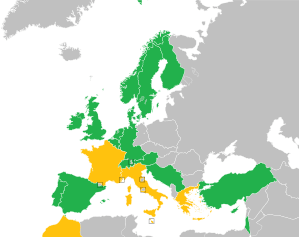Eurovision Song Contest 1982
The Eurovision Song Contest 1982 was the 27th edition of the annual Eurovision Song Contest. It was held on 24 April 1982 in Harrogate, North Yorkshire, United Kingdom. The presenter was Jan Leeming.
| Eurovision Song Contest 1982 | |
|---|---|
 | |
| Dates | |
| Final | 24 April 1982 |
| Host | |
| Venue | Harrogate International Centre Harrogate, United Kingdom |
| Presenter(s) | Jan Leeming |
| Conductor | Ronnie Hazlehurst |
| Directed by | Michael Hurll |
| Executive supervisor | Frank Naef |
| Executive producer | Michael Hurll |
| Host broadcaster | British Broadcasting Corporation (BBC) |
| Opening act | "Where Is Harrogate?" Film |
| Interval act | Pictures from Yorkshire and Castle Howard |
| Website | eurovision |
| Participants | |
| Number of entries | 18 |
| Debuting countries | None |
| Returning countries | None |
| Non-returning countries | |
Participation map
| |
| Vote | |
| Voting system | Each country awarded 12, 10, 8-1 point(s) to their 10 favourite songs |
| Nul points | |
| Winning song | "Ein bißchen Frieden" |
The German entrant, Nicole, was the winner with the song "Ein bißchen Frieden". Germany received 1.61 times as many points as runner-up Israel, which was a record under the current scoring system until 2009, when Norway received 1.78 times as many points as Iceland. The song also cemented Ralph Siegel and Bernd Meinunger, the song's composers, into German Eurovision tradition, writing 18 Eurovision songs between them before and after "Ein bißchen Frieden", 13 of which were for Germany.
This was the first time that Germany won the contest. They had competed in the finals every year since the contest's inception.
Location

Harrogate is a spa town in North Yorkshire, England. Historically in the West Riding of Yorkshire, the town is a tourist destination and its visitor attractions include its spa waters and RHS Harlow Carr gardens. Nearby is the Yorkshire Dales national park and the Nidderdale AONB. Harrogate grew out of two smaller settlements, High Harrogate and Low Harrogate, in the 17th century. The town became known as 'The English Spa' in the Georgian Era, after its waters were discovered in the 16th century. In the 17th and 18th centuries its 'chalybeate' waters (containing iron) were a popular health treatment, and the influx of wealthy but sickly visitors contributed significantly to the wealth of the town.
The Harrogate International Centre was chosen as the host venue for the contest. The grand convention and exhibition centre opened short time prior to the contest, and was the first big event held in the main 2000-seat auditorium.
Contest overview
The opening of the contest showed a map of Europe, with the translation "Where is Harrogate?" popping up on-screen from the languages of the various countries. The question was always in the language in which the respective country's song was performed, with the exception of Ireland. The Irish entry was sung in English, but the translation of the question in the map was in Irish. Then the map zoomed into Harrogate's location in Yorkshire, followed by an introduction video spotlighting the town.
Greece was due to participate in the contest with the song "Sarantapente Kopelies" performed by Themis Adamantidis. Although drawn to perform in second place, ERT withdrew the entry a few weeks before the contest.
In November 1981, France's national broadcaster, TF1, declined to enter the Eurovision Song Contest for 1982, with the head of entertainment, Pierre Bouteiller, saying, "The absence of talent and the mediocrity of the songs were annoyance set in. [Eurovision is] a monument to inanity [sometimes translated as "drivel"]."[1] Antenne 2 became the new broadcaster for Eurovision after public outcry, returning the country to the Contest in 1983.
The tradition of previous year's winners handing over the prize to current winners was not followed by Bucks Fizz, winners in 1981.
Irish band Chips lost out in their national finals, which, had they been successful, would have led to the unique situation of two bands in the same Eurovision with the same name (the other being Sweden).
This year, before the postcard of a specific country (with the exceptions of Israel, who had no commentator, and Yugoslavia, whose commentators were in their own country), the camera would zoom into the commentary box of that country's broadcaster, where the commentator/s would give a hand gesture, e.g. wave. The postcard would start with the country's flag on the screen and an excerpt of the country's national anthem (though in the case of the UK, the song played was Land of Hope and Glory instead of God Save the Queen, while the Israeli postcard began with an excerpt of Hava Nagila[2] instead of Hatikvah).
Conductors







.svg.png)


.svg.png)


.svg.png)




Results
There were 18 competitors in this year's final. No year since has had this few competitors in the final of the competition.
| Draw | Country | Artist | Song | Language[3] | Place | Points |
|---|---|---|---|---|---|---|
| 01 | Doce | "Bem bom" | Portuguese | 13 | 32 | |
| 02 | Svetlana | "Cours après le temps" | French | 6 | 78 | |
| 03 | Jahn Teigen & Anita Skorgan | "Adieu" | Norwegian | 12 | 40 | |
| 04 | Bardo | "One Step Further" | English | 7 | 76 | |
| 05 | Neco | "Hani?" | Turkish | 15 | 20 | |
| 06 | Kojo | "Nuku pommiin" | Finnish | 18 | 0 | |
| 07 | Arlette Zola | "Amour on t'aime" | French | 3 | 97 | |
| 08 | Anna Vissi | "Mono i agapi" (Μόνο η αγάπη) | Greek | 5 | 85 | |
| 09 | Chips | "Dag efter dag" | Swedish | 8 | 67 | |
| 10 | Mess | "Sonntag" | German | 9 | 57 | |
| 11 | Stella | "Si tu aimes ma musique" | French | 4 | 96 | |
| 12 | Lucía | "Él" | Spanish | 10 | 52 | |
| 13 | Brixx | "Video, Video" | Danish | 17 | 5 | |
| 14 | Aska | "Halo, halo" (Хало, хало) | Serbian | 14 | 21 | |
| 15 | Avi Toledano | "Hora" (הורה) | Hebrew | 2 | 100 | |
| 16 | Bill van Dijk | "Jij en ik" | Dutch | 16 | 8 | |
| 17 | The Duskeys | "Here Today Gone Tomorrow" | English | 11 | 49 | |
| 18 | Nicole | "Ein bißchen Frieden" | German | 1 | 161 |
Voting structure
Each country had a jury who awarded 12, 10, 8, 7, 6, 5, 4, 3, 2, 1 point(s) for their top ten songs.
Germany had the advantage of performing last. After coming second in 1980 and second in Dublin the year previously, Ralph Siegel and Bernd Meinunger took the first Grand Prix for Germany. The winner, Nicole, beat the nearest competition by 61 points and over 13 million West Germans watched her victory on television. Germany was the commanding leader for nearly the entire voting process.
Nicole went on to sing the reprise of her song in English, French and Dutch, as well as German, to the delight of the invited audience in Harrogate Conference Centre who stood to applaud her. The English version of her Eurovision winner, A Little Peace, subsequently shot to No. 1 in the UK Singles Chart.
Score sheet
| Juries | ||||||||||||||||||||
|---|---|---|---|---|---|---|---|---|---|---|---|---|---|---|---|---|---|---|---|---|
| Portugal | 32 | 7 | 4 | 5 | 2 | 1 | 6 | 1 | 4 | 2 | ||||||||||
| Luxembourg | 78 | 6 | 7 | 6 | 3 | 7 | 2 | 8 | 5 | 4 | 5 | 7 | 10 | 8 | ||||||
| Norway | 40 | 6 | 4 | 4 | 6 | 2 | 2 | 6 | 10 | |||||||||||
| United Kingdom | 76 | 4 | 12 | 6 | 10 | 4 | 5 | 3 | 12 | 1 | 2 | 6 | 2 | 1 | 7 | 1 | ||||
| Turkey | 20 | 8 | 3 | 1 | 3 | 3 | 2 | |||||||||||||
| Finland | 0 | |||||||||||||||||||
| Switzerland | 97 | 2 | 2 | 4 | 12 | 2 | 6 | 2 | 10 | 12 | 7 | 10 | 10 | 10 | 8 | |||||
| Cyprus | 85 | 5 | 4 | 12 | 3 | 8 | 8 | 5 | 3 | 7 | 5 | 7 | 12 | 6 | ||||||
| Sweden | 67 | 7 | 3 | 8 | 5 | 3 | 4 | 8 | 5 | 4 | 8 | 2 | 5 | 3 | 2 | |||||
| Austria | 57 | 10 | 7 | 7 | 6 | 8 | 6 | 4 | 4 | 5 | ||||||||||
| Belgium | 96 | 8 | 5 | 5 | 2 | 6 | 5 | 2 | 8 | 7 | 4 | 10 | 10 | 7 | 6 | 3 | 4 | 4 | ||
| Spain | 52 | 1 | 8 | 6 | 7 | 10 | 4 | 1 | 8 | 7 | ||||||||||
| Denmark | 5 | 3 | 1 | 1 | ||||||||||||||||
| Yugoslavia | 21 | 4 | 1 | 12 | 1 | 3 | ||||||||||||||
| Israel | 100 | 10 | 10 | 1 | 1 | 12 | 10 | 2 | 10 | 7 | 7 | 6 | 1 | 3 | 8 | 12 | ||||
| Netherlands | 8 | 3 | 5 | |||||||||||||||||
| Ireland | 49 | 1 | 2 | 7 | 1 | 6 | 5 | 5 | 3 | 5 | 8 | 3 | 3 | |||||||
| Germany | 161 | 12 | 10 | 8 | 12 | 10 | 12 | 12 | 8 | 1 | 10 | 12 | 12 | 12 | 12 | 6 | 12 | |||
12 points
Below is a summary of all 12 points in the final:
| N. | Contestant | Voting nation |
|---|---|---|
| 9 | Germany | Cyprus, Denmark, Ireland, Israel, Portugal, Spain, Switzerland, Turkey, Yugoslavia |
| 2 | Cyprus | Netherlands, Norway |
| Israel | Finland, Germany | |
| Switzerland | Belgium, United Kingdom | |
| United Kingdom | Austria, Luxembourg | |
| 1 | Yugoslavia | Sweden |
Returning artists
| Artist | Country | Previous year(s) |
|---|---|---|
| Stella Maessen | 1970 (for the Netherlands, part of Hearts of Soul), 1977 (part of Dream Express) | |
| Anna Vissi | 1980 (for Greece) | |
| Anita Skorgan | 1977, 1979 | |
| Jahn Teigen | 1978 | |
| Fatima Padinha (part of Doce) | 1978 (part of Gemini) | |
| Teresa Miguel (part of Doce) | 1978 (part of Gemini) | |
| Sally Ann Triplett (part of Bardo) | 1980 (part of Prima Donna) |
Commentators
Television
Participating countries







.svg.png)


.svg.png)


.svg.png)




Non-participating countries

Radio
Participating countries
Some participating countries did not provide radio broadcasts for the event; the ones who did are listed below.





.svg.png)


.svg.png)




Spokespersons







.svg.png)


.svg.png)


.svg.png)




National jury members




References
- 1982 Eurovision source in French
- https://www.youtube.com/watch?v=JfZCoEAFhAU
- "Eurovision Song Contest 1982". The Diggiloo Thrush. Retrieved 4 March 2012.
- Comentadores Do ESC - escportugalforum.pt.vu | o forum eurovisivo português Archived 21 April 2012 at the Wayback Machine
- Masson, Christian. "1982 - Harrogate". songcontest.free.fr.
- Hvem kommenterte før Jostein Pedersen? - Debattforum Archived 2 November 2012 at the Wayback Machine
- "Selostajat ja taustalaulajat läpi vuosien? • Viisukuppila". www.viisukuppila.fi.
- Savvidis, Christos (OGAE Cyprus)
- Infosajten.com Archived 18 July 2012 at the Wayback Machine
- "Archived copy". Archived from the original on 24 October 2007. Retrieved 14 May 2011.CS1 maint: archived copy as title (link)
- Adriaens, Manu & Loeckx-Van Cauwenberge, Joken. Blijven kiken!. Lannoo, Belgium. 2003 ISBN 90-209-5274-9
- "FORO FESTIVAL DE EUROVISIÓN • Ver Tema - Uribarri comentarista Eurovision 2010". Archived from the original on 17 March 2012.
- esconnet.dk - Forside Archived 24 March 2012 at the Wayback Machine
- www.eurovisionartists.nl. "Welkom op de website van Eurovision Artists". www.eurovisionartists.nl.
- "Eurovision Song Contest 1982". www.ecgermany.de.
- Dyrseth, Seppo (OGAE Norway)
- "Selostajat ja taustalaulajat läpi vuosien? • Viisukuppila". www.viisukuppila.fi.
- Baumann, Peter Ramón (OGAE Switzerland)
- Sumnja od Jugolasvenskog glasanja Archived 8 April 2012 at the Wayback Machine
- פורום אירוויזיון Archived 8 October 2011 at the Wayback Machine
- Diário Popular, 24 April 1982
- "Eurovision Türkiye jürisi belli oldu, Nuri Çolakoğlu and Emren Vardar, Milliyet, 18 April 1982
- "000webhost.com - free web hosting provider". Eurofestival.host22.com. Archived from the original on 15 August 2011. Retrieved 10 August 2012.
External links

- Official website

